
The Handmaid’s Tale (1990)
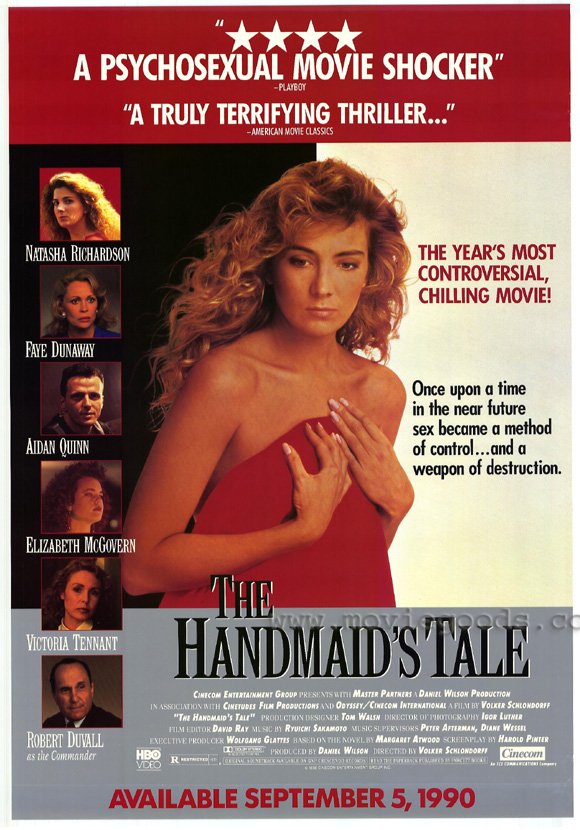
THE TRAILER
THE DIRECTOR
Volker Schlondorff
THE ACTORS
Natasha Richardson (Offred), Faye Dunaway (Serena Joy), Aidan Quinn (Nick), Elizabeth McGovern (Moira), Victoria Tennant (Aunt Lydia), The Commander (Robert Duvall), Traci Lind (Janine)
THE CAUSE
Disease/Famine/Pollution/Theocratic Totalitarian Government
THE STORY
“The air got too full once of chemicals and radiation. The rain water swarmed with toxic molecules. These poisons flowed into the rivers, crept into people. The result, sterility. Today, only one out of a hundred women can still bear children, and some women stopped. Believing there would be no future, they refused. Refused to bear children! They wouldn’t even try! They were lazy women! They were sluts! There is more than one kind of freedom. In the days of anarchy, it was ‘freedom to.’ Now, you’re being given ‘freedom from.’ Don’t underrate it.” – Aunt Lydia
THE RUNDOWN
Hulu’s The Handmaid’s Tale is a genuine cultural phenomenon that has ignited a discussion about gender politics in a sociopolitical climate that is deeply in need of such discussions. Lesser but no less wondrous feats include creating a popular and well-made series with a female driven narrative that feels like it’s actually from a woman’s gaze, legitimizing Hulu, and adapting Margaret Atwood’s nightmarish short novel on the medium of film. I personally haven’t watched a bit of it and am only aware of the praise that has been dropped upon it but in reading the novel upon which the show was based I recalled that it had been adapted once before as a movie in 1990. Before I would sit down to watch the series, I decided, I had to track down the movie and see where it had succeeded and failed in contrast to its source material and its descendant.
The story of the film is much the same as the novel, concerning a woman who is caught trying to cross the border from a dystopian hyper theocratic America to Canada only to be caught by the country’s border patrol. America has been taken over by a religious regime and renamed Gilead. After murdering the president and the congress, the government of Gilead then declared martial law, suspended the constitution and then began killing protesters and dissenters.
What’s worse, under the law of Gilead (a perversion of Christian law and dogma that twists almost every part of The Bible into something as bad as the worst parts that people don’t like to talk about) women cannot own property, hold jobs, drive, or read among other things. The wealthy may stay with their well-off husbands as wives, whilst other women serve as live-in servants known as “Marthas.” Since the world is suffering an outbreak of sterility, any fertile women are assigned to the houses of the wealthy “commanders” to serve as “handmaids.” Handmaids are essentially concubines, meant to get pregnant from the patriarch of the house (it is implied that the sterility is the result of a massive syphilis outbreak and that the men are largely the ones who are infertile but they are never tested because Gilead law sees women as flawed rather than men in the eyes of God) and provide a baby to the woman of the house. All other women are declared “Unwoman” and sent out to the wastelands to clean up the toxic and radioactive waste until they die of disease or radiation poisoning.
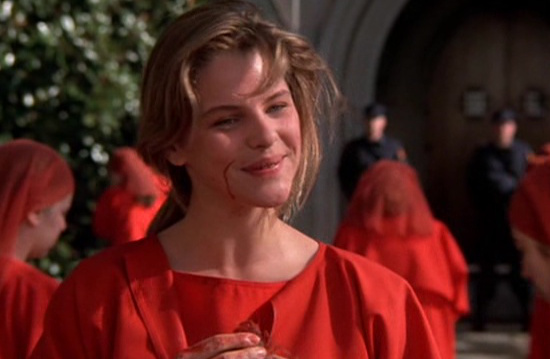
The problems with this adaptation of the Margaret Atwood novel begin to show immediately once we get into the film. The novel is set from a first-person perspective of a woman known only as Offred (more on that name in a bit) who is living in a hellscape. She has been caught trying to escape the country, she doesn’t know if her husband is dead or alive, her daughter has been taken from her by the government because her husband was on a second marriage (in the book it makes no bones about the fact that he had been cheating on his first wife with her before) so she is deemed an unsuitable parent.
Offred walks to the market with the handmaid of another house every day to get groceries, she sits in her room and thinks about how powerless she is to exact revenge on her owners or the even kill herself, and her biggest act of defiance is saving pats of butter in the toe of her shoe to use as ersatz face cream because the wives of the patriarchs that the handmaids “serve” feel that there’s no reason the women need to look even moderately attractive. They wear voluminous red robes with giant winged bonnets like the one Sally Field wore in The Flying Nun to prevent them from seeing anything that is not directly in front of them or from being seen by anyone who isn’t facing them. She has no name, no hope of seeing her family, no hope of escape, and the promise of a baby that will be taken from her if her owner’s sperm ever takes hold during their monthly sessions or a banishment to certain death in the wasteland.
This is a bleak and upsetting book to read, not because of any violence or intrigue. Offred’s life could not possibly be more bland and predictable, but that’s the real terror of the story. The evil of the book is rarely portrayed as evil; it’s played as concern for the soul of the country, as a belief that the new regime helps women from being raped or sexually assaulted and is doing them a favor by making it so they don’t have to work any longer, and as a desperate attempt to deal with declining birth rates. The normalcy of Offred’s world is what turns this speculative dystopian book into a full-on horror novel, admittedly one almost entirely bereft of violence or large conflict. It’s a fractured story about a woman with a fractured mind trying to keep her sanity in world gone mad. The problem is that the movie is just so casual. Offred frequently smiles or speaks in plain speech, she laughs and drinks, everyone is wearing make-up, and Offred frequently seems like she’s delighted with her lot in life when the scenes call for her to be, at best, depressedly bemused.
I can’t blame this all on Offred, though. The movie is shot so cheerily in pleasant sunlight, which can be used as a contrasting tool to accentuate horror but that’s not what it’s doing here. The movie tells us Offred’s real name, which undermines the entire purpose of having a protagonist who is already dehumanized at the start of the story. The fact that we only know Offred by her owner is a commentary about the way society perceives women through their relationship to men. Giving Offred the name of Kate, which she drops as often as she can, completely misses the core of the character who sees her own self as “a missing person.”
The women in the stories are all made to dress obscenely modest, but in the film the wives wear smart 1980’s working women dresses with shoulder pads and the maids themselves wear simple red dresses which would only be considered immodest in the 1940s. Instead of the huge bonnet with the blinders, the maids wear a see-through red veil which they occasionally use to tie up their hair. The film implies that they’re meant to wear it over their entire head in certain instances but based on the backgrounds of nearly every scene there is no rhyme or reason to when a handmaid is to wear her hat. It should also be noted that this 1990 movie looks like it was filmed in the late 70s or mid-80s.
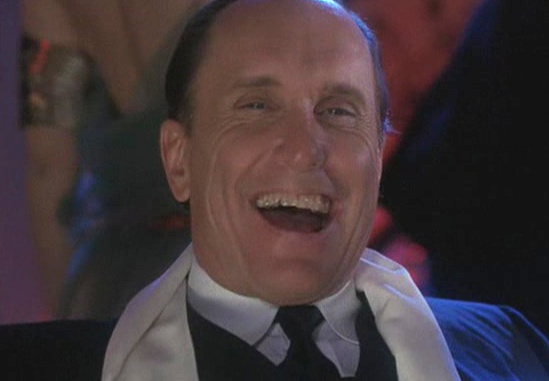
The movie does get all the big strokes right. Victoria Tennant is a wonderfully unlikable taskmaster of the school that prepares the handmaids, employing emotionally abusive tactics that turn the women on each other and are distressingly used in the real world frequently in those prisons for wayward teens that shitty parents mail their misbehaving children to.
One idea from the novel that comes through splendidly is the way that no one thing caused the world to be the way it is. It’s not religion, misogyny, well-meaning sexism, the patriarchy, or desperation that create Gilead, it’s a combination of these things gone unchecked for centuries coming to a head. The book and movie are peppered with references to other branches of Christianity (Baptists, Catholics, among others) who are fighting or opposed to Gilead and mentions Jewish people being forced to convert or deported to Israel in ships.
Many scenes such as the “group therapy” above or the public hanging of a handmaid who tries to get impregnated by a doctor since her commander has been unable to do so, work wonderfully but the rest of the movie is just so detached and cheerful in a really distressing way. At times it nearly tips over into camp, which is exactly the wrong attitude for this material.
The most wronghearted idea in the movie is making Offred and The Commander’s driver Nick’s relationship a proper Hollywood love story rather than the way it was portrayed in the book of two people caught up in the horrible world finding solace in one another. There’s no room for tenderness or treacle here, her tryst with Nick is meant to be as desperate as her rubbing butter on her face to moisturize, she’s using him and he’s using her and they both know it and that’s as happy as things are going to get for them. The sex scene between the two, which involves a considerable amount of nudity from Natasha Richardson just feels uncomfortably inappropriate; it’s so upsetting that my notes just say “sex scene = WHAT THE FUCK?!” Now, I’m no prude about nudity in movies, least of all bare breasts but I know the reason why movies want to show me bare breasts and it is a reason which could not be more frighteningly opposed to the tone of the piece. Once again, it’s a subversion that could be mined for philosophical purposes but doesn’t seem to be.
One of the biggest casualties of the story is Offred’s friend Moira. In the book, Moira is Offred’s college roommate and best friend. She is almost a caricature of a women’s libber and the way Atwood takes her stereotypical qualities (she’s opinionated and outspoken, gay, and mechanically inclined) and turns her into a sort of inspirational action hero to Offred is a set-up for the best pay-off in the book. Here Moira’s sexual proclivities are barely mentioned, and she mostly just cracks wise in a way that feels fine for the character but way off for the tone of the film.
Spoilers until after the next picture. The big reveal at the end of the book that Moira was captured after her triumphant escape and turned into a literal sex slave for a speak-easy sex club run by the wealthy and the way she tries to convince Offred to join her is a horrifying moment because it represents that the world is so broken that even a big tough dyed-in-the-wool feminist warrior like Moira can be broken. In the movie Offred actually smiles through Moira’s explanation of what happened and then looks horrified only when she sees that the secret police messed up Moira’s hand for escaping.
Even the club, called Jezebel’s, is played like some sort of glitzy ’80s bondage club when in the book it was a dilapidated hotel where women pranced around in ratty torn up cast-offs of women’s clothing deemed too racy by the Gilead government. In the movie the commander has Offred wear a long black dress with a boa, in the book it’s a sequined one-piece swimsuit with missing sequins and a musty smell. That feeling of disgustingness is not translated into the movie.
But it’s the ending where The Handmaid’s Tale completely shits the bed. The movie has three endings. First we have the one from the book where Offred is collected by the secret police who turn out to be undercover operatives of “The Underground Femaleroad”, then a news reel where it talks about the importance of Robert Duvall’s Commander after he has been killed, and then the Sarah Connor ending where we flash to Offred living alone in the mountains in a trailer talking about how she misses Nick as she waits for their baby to be born, knowing one day she’ll get her daughter back. This last section is accompanied by a voice-over from Offred that isn’t featured anywhere else in the film and I swear I can practically hear the Terminator theme playing as the credits roll over it.
The ending of this movie completely misses the point of the entire story. Offred doesn’t even try to kill the Commander in the novel because doing so would serve no purpose, in the book he’s a man of some status but has no apparent sway over the running of the government. We’re left to wonder what happened to Offred with no clear answer and then the book ends with a group of professors going over the entire novel some 200 years later as it was transcribed from cassette tapes. Their analysis is the final twist of the knife in story as the casual dismissal of the tale by the academics is meant to signify that nothing has or will change and while Gilead is an extreme example of patriarchy, religion, desperation, and casual sexism joining together in one nightmare stew the thoughts and ideas that created Gilead are still alive and well. Offred is irrelevant and so is her hope, she’s merely a peek into the world and the way it is seen on the ground from the viewpoint of a woman and a handmaid. Taking on a hopeful semi-happy ending just steps all over these points.
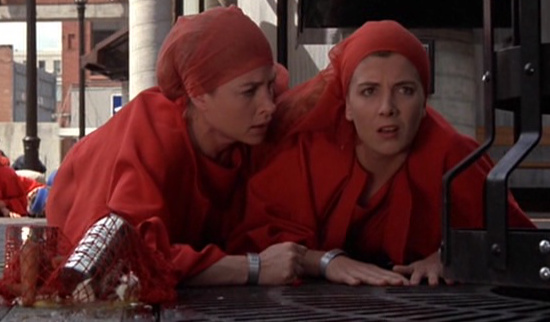
Much of The Handmaid’s Tale does work but that’s largely because of its fealty to the source material. It is unfortunately a very disposable movie mostly made interesting by the ideas which are brought across better in print. The book, much like other dystopian novels such as The Giver and Farenheit 451 really only seems to be getting started when it ends and there’s not a lot of meat to pick from these bones. The movie version tries to expand on the narrative but trims too much of the good stuff and adds too much of the bad. It’s interesting as all adaptations are from a curiosity standpoint but even without seeing the show I can already say that it makes this movie irrelevant. It’s not bad but it’s really nothing to write home about.
THE SHILL
The Handmaid’s Tale is available on Blu-ray from Shout! Factory’s Shout Select line and can also be found on Amazon Instant.
NEXT TIME ON DOOMSDAY REELS
“Ah, how touching. The trinity of bitches, united in their hatred.”
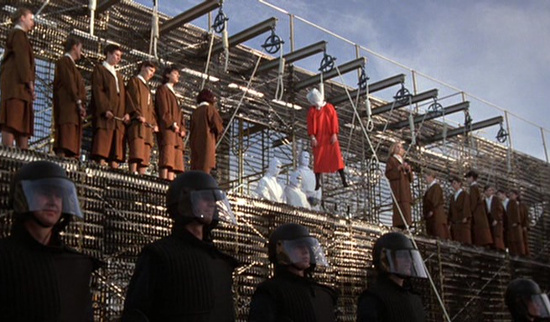
Discuss this and other Doomsday Reels columns in the forum.